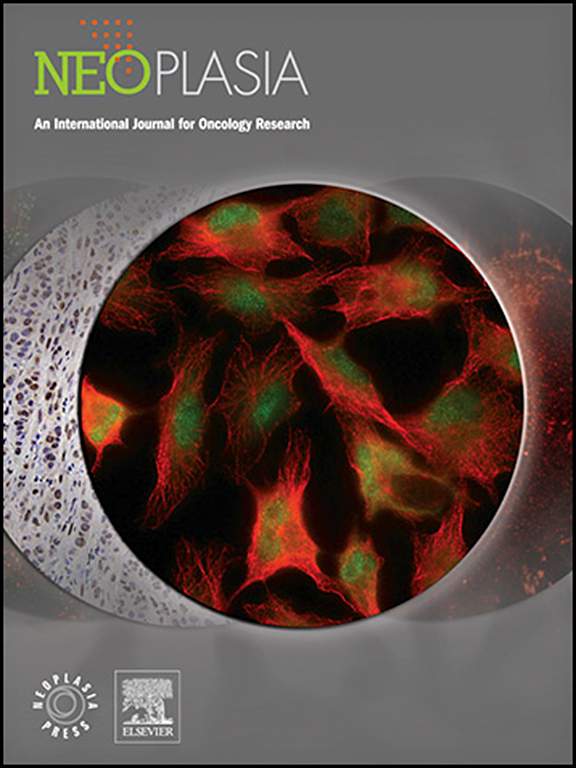An antibody targeting an immune checkpoint molecule BTN2A2 enhances anti-tumor immunity
IF 7.7
2区 医学
Q1 Biochemistry, Genetics and Molecular Biology
引用次数: 0
Abstract
Tumors exploit immune checkpoints to evade immune responses. Therefore, targeting these checkpoints has become a key strategy in cancer immunotherapy. In this study, we have developed a novel immune checkpoint inhibitor (ICI) targeting the B7 family-related molecule BTN2A2. The human BTN2A2 protein, which was highly expressed in some tumor tissues and activated antigen-presenting cells (APCs), can inhibit T cell activation and proliferation. The anti-BTN2A2 monoclonal antibody (mAb) can neutralize the inhibitory effect of BTN2A2 on T cells. In mouse models of pancreatic cancer and glioma, compared to the control group, the anti-BTN2A2 treatment group exhibited tumor shrinkage of 35.8 % (P < 0.05) and 51.2 % (P < 0.01), respectively, along with increased CD8+ tumor-infiltrating lymphocytes (TILs) by 1.7-fold (P < 0.001) and 2.2-fold (P < 0.001), respectively. In addition, anti-BTN2A2 mAb also increased the infiltration of B cells, M1 macrophages, and the expression of inflammatory cytokines in T cells, while reducing the infiltration of M2 macrophages, myeloid-derived suppressor cells (MDSCs), and regulatory T cells (Tregs). Thus, anti-hBTN2A2 mAb normalizes the immunodeficient tumor microenvironment (TME) and inhibits tumor growth. Our results suggest that targeting the BTN2A2 immune checkpoint may represent a novel strategy for cancer treatment, especially in immunosuppressive 'cold' tumors.
一种靶向免疫检查点分子BTN2A2的抗体增强抗肿瘤免疫
肿瘤利用免疫检查点来逃避免疫反应。因此,靶向这些检查点已成为癌症免疫治疗的关键策略。在这项研究中,我们开发了一种针对B7家族相关分子BTN2A2的新型免疫检查点抑制剂(ICI)。人BTN2A2蛋白在部分肿瘤组织和活化的抗原呈递细胞(APCs)中高表达,可以抑制T细胞的活化和增殖。抗BTN2A2单克隆抗体(mAb)可以中和BTN2A2对T细胞的抑制作用。在胰腺癌和胶质瘤小鼠模型中,与对照组相比,抗btn2a2治疗组肿瘤缩小35.8% (P <;0.05)和51.2% (P <;0.01), CD8+肿瘤浸润淋巴细胞(TILs)增加1.7倍(P <;0.001)和2.2倍(P <;分别为0.001)。此外,抗btn2a2单抗还增加了B细胞、M1巨噬细胞的浸润和T细胞中炎症因子的表达,同时减少了M2巨噬细胞、髓源性抑制细胞(MDSCs)和调节性T细胞(Tregs)的浸润。因此,抗hbtn2a2单抗使免疫缺陷肿瘤微环境(TME)正常化并抑制肿瘤生长。我们的研究结果表明,靶向BTN2A2免疫检查点可能代表了一种新的癌症治疗策略,特别是在免疫抑制的“冷”肿瘤中。
本文章由计算机程序翻译,如有差异,请以英文原文为准。
求助全文
约1分钟内获得全文
求助全文
来源期刊

Neoplasia
医学-肿瘤学
CiteScore
9.20
自引率
2.10%
发文量
82
审稿时长
26 days
期刊介绍:
Neoplasia publishes the results of novel investigations in all areas of oncology research. The title Neoplasia was chosen to convey the journal’s breadth, which encompasses the traditional disciplines of cancer research as well as emerging fields and interdisciplinary investigations. Neoplasia is interested in studies describing new molecular and genetic findings relating to the neoplastic phenotype and in laboratory and clinical studies demonstrating creative applications of advances in the basic sciences to risk assessment, prognostic indications, detection, diagnosis, and treatment. In addition to regular Research Reports, Neoplasia also publishes Reviews and Meeting Reports. Neoplasia is committed to ensuring a thorough, fair, and rapid review and publication schedule to further its mission of serving both the scientific and clinical communities by disseminating important data and ideas in cancer research.
 求助内容:
求助内容: 应助结果提醒方式:
应助结果提醒方式:


